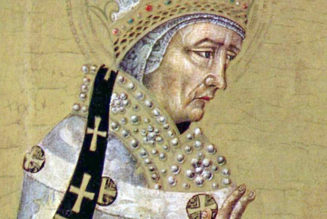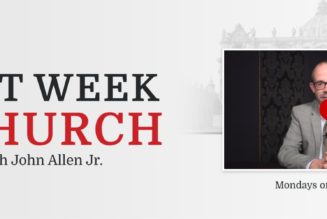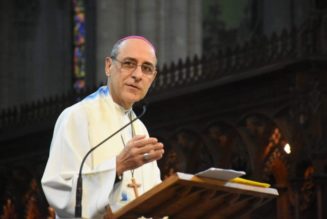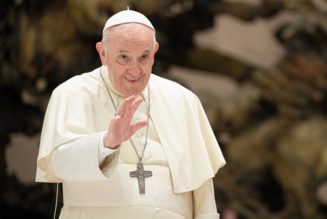
Oops. You made a promise to God in a moment of excitement — at a retreat, or feeling blessed after confession, or at some other point when you were so grateful you would do anything for him.
And that’s what you promised: Anything and everything. Then you failed and tried to forget it.
The Gospel for the Third Sunday of Easter Year C tells the story of what Jesus thinks about the matter.
The Gospel passage from John masterfully sets the scene.
“Jesus revealed himself again to his disciples … in this way,” It begins, then tells us who was there, because who was there is important.
- Simon Peter, the leader of the apostles is there, and brought the others with him, saying “I am going fishing” then leading them through a fruitless night of work.
- Thomas, the skeptic converted by evidence is here. He had cried out “My Lord and my God!” when he saw the wounds of the risen Jesus.
- Nathaniel, the skeptic converted by Scripture is there. He had said “Rabbi, you are the son of God! You are the King of Israel!” when he met Jesus, just because Jesus had referenced the prophet Ezekiel’s image of a fig tree.
- James and John are there too, but they are called the “sons of Zebedee,” to emphasize the importance of their family.
Jesus doesn’t appear to everyone indiscriminately, but comes to those who have been prepared to see him. He does the same today:
- He comes to those of us who follow his leader on earth, Peter.
- He comes to those of us who searched for him in our lives.
- He comes to those of us who sought him out in Scripture.
- He comes to those of us who only met him because of our faithful families, like the Zebedees.
And he comes to us in our ordinary lives, when we gather with friends, when we are out on whatever lake we fish in every day.
When we meet him, Jesus starts by improving our old lives, and ends by calling us to new lives.
“Children, have you caught anything to eat?” he asks his apostles. They didn’t, so he tells them, as he did in the very beginning, to cast their net his way, instead of theirs.
They obey and catch too many fish to pull in easily. Peter leaps excitedly into the sea to rush to his side; the other apostles come laboriously ashore, dragging the fish. They all come from hours of hard labor on their own unsteady boat to rest on the shore, the terra firma of friendship with Jesus.
Jesus, standing next to a charcoal fire says, “Come, have breakfast.” This is a joy of the highest order: If you have ever eaten outside with friends after hard work, you know that no other meal can even come close. It is in this context that Jesus takes Peter aside and asks him probing questions: “Do you love me?” causing troubled and heartfelt answers, “You know I love you.”
This absolutely applies to each of our lives.
- Jesus loves to ask probing questions. The rabbis discovered this when he was a boy and it astonished them. Anyone who has spent time with him in the Tabernacle has experienced the same thing. Sometimes he tell us things, but usually he asks us things, calling our freedom to search for him, discover him, and embrace him.
- Jesus doesn’t ask Peter, “Were you morally superior to everyone else?” Much less, “Do you know more than everyone else?” and certainly not “Are your politics right?” He asks, “Do you love me?” He asks us the same thing.
- Then he asks “Do you love me more than these?” and that question must have especially bothered Peter, and it should bother us. Let me explain.
Remember: Peter had promised that he would love Jesus more than anyone else. He would love him to the end, even giving up his life for him, but then he had denied him. Now, Jesus does something far more surprising and momentous than merely forgiving him. He makes it clear he still expects Peter to keep his promise.
He expects Peter to do what he said, love him more than the others, feed his sheep, and be led away for him. The same thing happens in our lives.
Remember that time when, in a moment of high emotion, you pledged to Jesus that you would be a saint — for real, you said, a canonizable saint! — giving all for him, no matter what? And later, you cooled down and laughed it off as over-excitement and tried to forget all about it, maybe even felt a little embarrassed by it? If you have your journal from the retreat where you wrote it down, go get it, and know this: Jesus doesn’t forget your promise. Maybe the specific way you thought it would happen — I will be a martyr for you! I will join religious life for you! — can’t happen anymore, but he still wants to see you fulfill the core of the promise: to give him everything.
He is here, this Sunday, in the Gospel, on the altar, and in the tabernacle to remind you, gently but unmistakably, that he hasn’t forgotten and that he trusts you will find a way to get it done.
In the First Reading, we see how Peter fulfilled his promise.
Peter denied Jesus on the night before he died because he didn’t want to look bad in front of a servant. Now, in the Acts of the Apostles, a captain and court officers drag him in front of the highest religious officials who say: “We gave you strict orders, did we not, to stop teaching in that name? Yet you have filled Jerusalem with your teaching and want to bring this man’s blood upon us.”
Here is Jesus giving Peter his second chance to fulfill his promise, and that’s exactly what happens. Peter does the opposite of what he did with the servant girl.
- First, he refuses to give in to human respect, telling the high officials, to their faces, “We must obey God rather than men.”
- Then he does for his accusers what Jesus did for him, naming clearly the wrong they are guilty of: “The God of our ancestors raised Jesus, though you had him killed.”
- Last, he offers his accusers a chance to join in Jesus’s great project of love. “God exalted him at his right hand as leader and savior to grant Israel repentance and forgiveness of sins. We are witnesses of these things, as is the Holy Spirit whom God has given to those who obey him.”
It works. The Sanhedrin releases him. Maybe someone was even converted by hearing him speak — we don’t know. But the point is, Peter fulfilled his promise after all, doing what amounted to giving his life for Jesus — and he lived to see another day. “So they left the presence of the Sanhedrin, rejoicing that they had been found worthy to suffer dishonor for the sake of the name,” the reading concludes.
In the Second Reading, we see how Christ fulfills his promise.
What happens to Peter in the end? Well, we know him as Saint Peter, and in the Second Reading, John describes where Peter is now, in heaven, where “the voices of many angels” surround the throne, crying, “Worthy is the Lamb that was slain to receive power and riches, wisdom and strength, honor and glory and blessing.” Every creature in heaven and on earth cries out: “To the one who sits on the throne and to the Lamb be blessing and honor, glory and might, forever and ever.” And heaven resounds with a mighty “Amen” as elder worshipers — is Peter among them? — fall on their faces in praise.
The sequence for Peter goes: Encounter with Jesus, witness to Jesus, then glory with Jesus. The sequence for us is exactly the same.
We meet Jesus in one of the places those five Apostles met him: in Peter’s company, the Church; in our sincere seeking of God in the world; in our Bible study; or in our family and friends who sought him for us. Then we spend time with him in his sacraments, confessing and communing with him, and hearing the questions he is asking deep in our soul.
Next, we witness to him in the world, refusing to downplay him out of self-consciousness, proclaiming his truth clearly but gently.
Last, in his mercy, we hope he will welcome us to join his company in heaven, dropping to our faces in awe and reverence.
This is also the sequence we find at each Mass: We meet him in his words, we witness to him in the creed, then we kneel before his altar.
If we listen closely, we will hear the grand promise we made to him, still ringing in his ears — and hear the smile in his voice as he asks us, “And now, tell me, how can we get this done — together?”
Jesus is the best kind of friend imaginable: You gave up on your dreams. He won’t.
Join Our Telegram Group : Salvation & Prosperity









